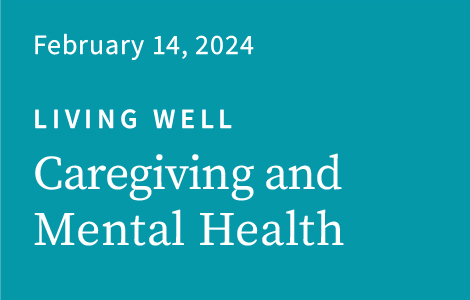Transcript
Caregiving and Mental Health
In my role as a therapist and coach to families caring for a loved one with dementia, I have counseled hundreds of caregivers over the years. I have learned that caring for someone with dementia is a journey that demands resilience, compassion, and understanding. Caregivers devote so much of themselves in this role that they often overlook their own mental well-being. In an earlier episode, Lena reflected on the importance of self-care for dementia caregivers. In today’s episode, my goal is to help you identify warning signs of caregiver stress and burnout and to offer strategies to navigate caregiving while prioritizing mental health and well-being.
I’ve known a man I’ll call Jake for about 10 years, and I recently attended a memorial service for his wife, Samantha. A former nurse, Samantha was forced into early retirement following her diagnosis of early-onset Alzheimer’s at age 58, and Jake joined one of my support groups a few years into her illness. Over the years, Samantha lost her ability to speak, and she was eventually wheelchair-bound. Jake took incredible care of her; his love and devotion knew no limits. And it began to show. He lost a significant amount of weight and experienced bouts of anger and frustration that were out of character for him. Caregivers experiencing these symptoms must find ways to manage their stress. Jake was able to recognize that he was feeling depressed and eventually accepted antidepressants from his doctor, and he turned to his spiritual community for support. Jake was an outstanding caregiver to Samantha but fell short when it came to prioritizing his self-care, and he eventually ended up in the hospital. He was not able to be there for Samantha, who was on hospice at home, so she was taken to a nursing home for her end-of-life care. Jake recovered quickly, but it took this incident for him to realize that he had reached his limit, and that Samantha undeniably needed a higher level of care. Sadly, Samantha died a couple of weeks later. This was a traumatic experience for the family, and it didn’t need to get to that point.
In helping Jake and countless others over the years, I’ve come to understand just how much of an emotional toll caring for someone with dementia takes. It’s a complex mix of love, devotion, stress, and grief. The constant adjustments, uncertainties, and watching the decline in a loved one’s abilities can be overwhelming. Caregivers often experience a rollercoaster of emotions from sadness and frustration to guilt and even isolation. The unpredictability of dementia symptoms can intensify these feelings. Caregivers experience the pain associated with ambiguous loss—the loss of the person they once knew and the shifting dynamics in their relationship—while the person is physically present and often appears the same as they used to. It’s essential for caregivers to acknowledge these emotions as normal responses to the caregiving experience and seek support when needed to prevent burnout or more serious mental health issues.
I want to underscore the importance of self-care through the lens of Jake’s story. For caregivers like Jake to prioritize their own physical and emotional health, they must set boundaries, arrange for respite care, and engage in activities that bring joy and relaxation, such as spending time with family and friends, listening to music, gardening, or just being in nature. Additionally, building a support network, whether through a support group or connecting with other caregivers, can provide a sense of understanding and solidarity. Jake did some of these things, but perhaps he could have done more to protect himself.
Early on, caregivers should become educated about the diagnosis, its symptoms, and the stages of disease. They should learn about ways to communicate effectively so that they can adapt their approach and respond to their loved one’s needs, fostering a more supportive environment, which can contribute to a reduction in stress. Learning how to communicate with the patient’s care team can lead to feeling more empowered as a caregiver, and learning how to ask for help from family and friends can result in getting a much-needed break from time to time. Your doctor’s care team or your local Alzheimer’s Association chapter should have resources you can go to for help. Jake enrolled in our caregiver class and attended monthly support groups, which proved to be quite helpful for him, yet he continued to feel the weight of the stress caused by the unrelenting nature of his wife’s decline and his sense of hopelessness.
Chronic stress can lead to burnout, anxiety, and depression. Caregivers must recognize the signs of burnout, such as fatigue, irritability, and withdrawal. Other signs to watch out for are denial, anxiety, depression, sleeplessness, lack of concentration, and health problems. Consider Jake’s story a cautionary tale and talk to a professional who can help you find ways to prioritize your emotional well-being. After all, if you become ill, who will care for your loved one?
There are many ways that dementia caregivers can prioritize their mental health. Mindfulness meditation and regular exercise can help manage stress levels, as can spending time in nature. Professional counseling or therapy can offer invaluable support in coping with the emotional strain and preserving mental health. Learning about resources available in your community, such as support groups, in-home help, or day centers, will help bolster your network. Physical exercise becomes increasingly important for caregivers, as does getting breaks by securing respite care. Caregivers tend to neglect their physical health, so it’s important to recognize this and keep up with your own doctor’s appointments. Legal and financial planning early in the diagnostic process is imperative so that the person with the disease can participate. Having plans in place can provide comfort to the entire family, and many of the documents can be prepared without the help of an attorney. However, finding an elder law attorney can help those who are unsure about how to complete legal documents or make financial plans. Don’t forget to maintain a sense of humor! This doesn’t mean you’re making light of your situation; humor can be a valuable coping strategy and help alleviate stress. Finally, it’s recommended that folks prepare for life after caregiving. The caregiving role lasts for many years, and people like Jake often take great pride in their enduring love and care. It becomes an identity for many people, so it’s important to prepare for what life will look like when the role finally ends.
Furthermore, caregivers should set realistic expectations as they learn to cope with the evolving nature of dementia caregiving. This involves accepting limitations and understanding that caregiving is not a solo journey. Flexibility is crucial as the needs of the person with dementia change. It’s okay to seek additional assistance and adapt routines as necessary. Accepting these changes helps ease the pressure on oneself and fosters a more sustainable caregiving approach. I understand that it might feel daunting to engage in these preventive measures, so tap into your resources and reach out to a professional for help.
To all of the caregivers listening today: Your dedication and love make an immeasurable difference in your loved one’s life. Remember that it’s okay to ask for help, prioritize your well-being, and embrace the journey with compassion, both for your loved one and yourself. If you are feeling overwhelmed or helpless, ask your doctor’s office for a referral to a therapist who specializes in dementia care, caregiving, and grief and loss. A website called Psychologytoday.com is another resource for people looking for a therapist who understands your unique experience. If you are feeling hopeless or suicidal, please seek help from a local crisis center or call 988 for help. If your situation feels unbearable, remember that you do not have to go through it alone. There are resources and help available to you, and it’s never too late to start caring for yourself.
Felicia Greenfield, MSW, LCSW
[email protected]

